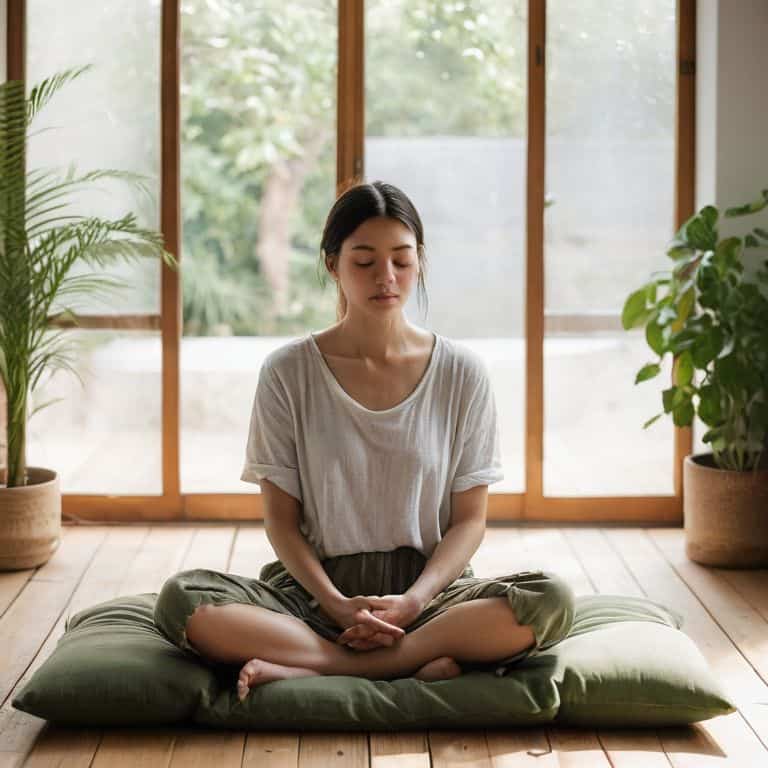I still remember my first attempt at meditation – I sat in my small urban garden, surrounded by the soothing sounds of nature, and felt like I was doing everything wrong. My mind wandered, and I struggled to focus on my breath. It was then that I realized that common challenges when you start meditating are not just about the practice itself, but about our own expectations and perceptions. We’re often led to believe that meditation is a magical solution that will instantly calm our minds and bring us inner peace, but the reality is that it’s a journey, not a destination.
As someone who’s been on this journey, I want to assure you that you’re not alone in facing these challenges. In this article, I’ll share my personal experience and provide you with honest and practical advice on how to overcome the obstacles that come with starting a meditation practice. I’ll cut through the hype and give you a step-by-step guide on how to make meditation a sustainable and enjoyable part of your daily routine. My goal is to empower you with the knowledge and confidence to start meditating, even if it’s just for a few minutes a day, and to help you understand that it’s okay to take it one breath at a time.
Table of Contents
Starting Meditation Journey

As I reflect on my own journey with meditation, I remember how daunting it seemed at first. Overcoming meditation obstacles was a significant hurdle, but with patience and practice, I was able to establish a daily routine that worked for me. I started by setting aside just a few minutes each day to sit quietly and focus on my breath. It wasn’t always easy, and my mind would often wander, but I found that calming a restless mind through meditation was a skill that could be developed over time.
One of the most helpful techniques I discovered was to start small and be consistent. Mindfulness for beginners can be as simple as paying attention to your breath or body sensations. I found that using a guided meditation app helped me stay on track and learn various meditation techniques for focus. As I continued to practice, I noticed a significant reduction in stress and anxiety, and I was better able to manage my emotions.
As you begin your own meditation journey, remember that it’s okay to start slow and make mistakes. The key is to be gentle with yourself and keep moving forward. By establishing a daily meditation routine, you can begin to experience the many benefits of meditation, including reduced stress and increased focus. With regular practice, you’ll find that meditation becomes a valuable tool for managing stress and improving your overall well-being.
Calming a Restless Mind Through Breath
When we first start meditating, it’s common to feel like our minds are racing. To calm a restless mind, we can focus on our breathing technique. By paying attention to the sensation of the breath moving in and out of the body, we can begin to quiet the mind.
As we practice, we can use gentle reminders to bring our focus back to the breath. This might be a physical sensation, such as the feeling of the breath in the nostrils, or a mental note, such as a simple “in” and “out” as we breathe.
Overcoming Meditation Obstacles With Ease
As you continue on your meditation journey, it’s essential to address the challenges that may arise. One of the most significant hurdles is maintaining consistency, which can be achieved by setting aside a dedicated time and space for practice. By doing so, you’ll be able to create a peaceful atmosphere that fosters growth and calmness.
To overcome obstacles, remember that patience is key. It’s normal for your mind to wander, and it doesn’t mean you’re doing anything wrong. Gently acknowledge the distraction and refocus on your breath, allowing yourself to settle back into a calm state.
Common Challenges When Meditating

As you embark on your meditation journey, it’s essential to acknowledge the hurdles you may face. One of the primary concerns for mindfulness for beginners is establishing a consistent practice. Creating a daily routine can be daunting, but overcoming meditation obstacles can be achieved by starting small and being patient with yourself.
When you first begin meditating, you might find it challenging to calm a restless mind through meditation. Your thoughts may wander, and you might feel like you’re not doing it correctly. However, this is a normal part of the process, and with time, you’ll become more comfortable with the practice.
To make progress, focus on establishing a daily meditation routine that works for you. Start with short sessions and gradually increase the duration as you become more comfortable with the practice. Remember, the goal of meditation isn’t to achieve a completely quiet mind but to learn to manage stress through meditation and cultivate awareness. With consistent practice and the right mindset, you can overcome the initial hurdles and experience the benefits of meditation.
Establishing Daily Mindfulness for Beginners
To establish a daily mindfulness practice, it’s essential to start small and be consistent. I recommend beginning with short meditation sessions of 5-10 minutes, focusing on your breath and body sensations. As you get into the habit, you can gradually increase the duration and explore different techniques.
Remember, the key to making mindfulness a part of your daily routine is to create a calm environment that fosters relaxation and reduces distractions. This could be as simple as designating a quiet corner in your home or taking a few minutes each morning to sit outside and connect with nature.
Managing Stress With Simple Meditation Techniques
When we start meditating, it’s common to feel like we’re not doing it right or that our minds are too restless. Simple meditation techniques can help calm the mind and reduce stress. By focusing on our breath, we can begin to quiet the mind and find a sense of calm.
To manage stress effectively, it’s essential to practice mindful breathing regularly. Even just a few minutes a day can make a big difference in how we feel. By incorporating meditation into our daily routine, we can learn to navigate stressful situations with more ease and clarity.
Navigating the Path: 5 Essential Tips for Overcoming Common Meditation Challenges
- Set aside a dedicated space for meditation, free from distractions, to help signal to your mind that it’s time to focus
- Begin with short sessions, even just 2-5 minutes, and gradually increase the duration as you become more comfortable with the practice
- Focus on the sensation of the breath moving in and out of the body, rather than trying to control it, to cultivate a sense of awareness and calm
- Practice self-compassion when your mind wanders, gently acknowledging the distraction and refocusing on the breath without judgment
- Establish a consistent routine, such as meditating at the same time each day, to help make the practice a sustainable and enjoyable part of your daily life
Key Takeaways for a Successful Meditation Journey
Start small and be consistent: Begin with short meditation sessions and gradually increase the duration as you become more comfortable with the practice, allowing you to better manage your time and reduce stress
Focus on your breath: Use your breath as an anchor to calm your mind and bring you back to the present moment when your thoughts wander, helping you develop greater self-awareness and clarity
Be patient and kind to yourself: Remember that meditation is a journey, and it’s okay if your mind wanders – gently acknowledge the thought and return to your breath, celebrating small victories along the way and nurturing a more compassionate relationship with yourself
A Meditation Reminder
The biggest challenge in starting a meditation practice isn’t the act of meditating itself, but rather being gentle with ourselves as we learn to quiet the mind and listen to our breath.
Hannah Jensen
Embracing the Journey of Meditation

As we’ve explored the common challenges that arise when starting a meditation practice, it’s essential to remember that these obstacles are a natural part of the journey. We’ve discussed the importance of calming a restless mind through breath, overcoming meditation obstacles with ease, and establishing daily mindfulness for beginners. By acknowledging and addressing these challenges, you can set yourself up for success and make progress in your meditation practice. Whether you’re struggling to manage stress or simply looking to cultivate a greater sense of calm, meditation can be a powerful tool to help you achieve your goals.
As you continue on your meditation journey, remember that the key to progress is consistency and patience. Don’t be too hard on yourself if your mind wanders or you miss a day (or two). Instead, focus on showing up to your practice with an open heart and mind, and trust that the benefits will follow. With time and dedication, you can unlock the full potential of meditation and experience the profound impact it can have on both body and mind. So, take a deep breath, be kind to yourself, and keep moving forward – you got this!
Frequently Asked Questions
What are some common mistakes to avoid when starting a meditation practice?
When starting meditation, some common mistakes to avoid include having unrealistic expectations, being too hard on yourself, and not setting aside a consistent time to practice. Remember, it’s okay if your mind wanders – simply acknowledge the thought and gently bring your focus back to your breath. Start small and be patient with yourself as you develop this new habit.
How can I deal with feelings of frustration or self-doubt when my mind keeps wandering during meditation?
When your mind wanders, gently acknowledge the thought and refocus on your breath – don’t worry, it’s normal. Remember, meditation isn’t about achieving a completely blank mind, but about cultivating kindness towards yourself as you learn to stay present.
Are there any specific meditation techniques that are more suitable for beginners to help overcome initial challenges?
For beginners, I recommend starting with simple techniques like mindful breathing, body scan meditation, or guided meditation. These methods are great for calming a restless mind and helping you establish a daily practice. You can find many free resources online, including apps and videos, to get you started.
